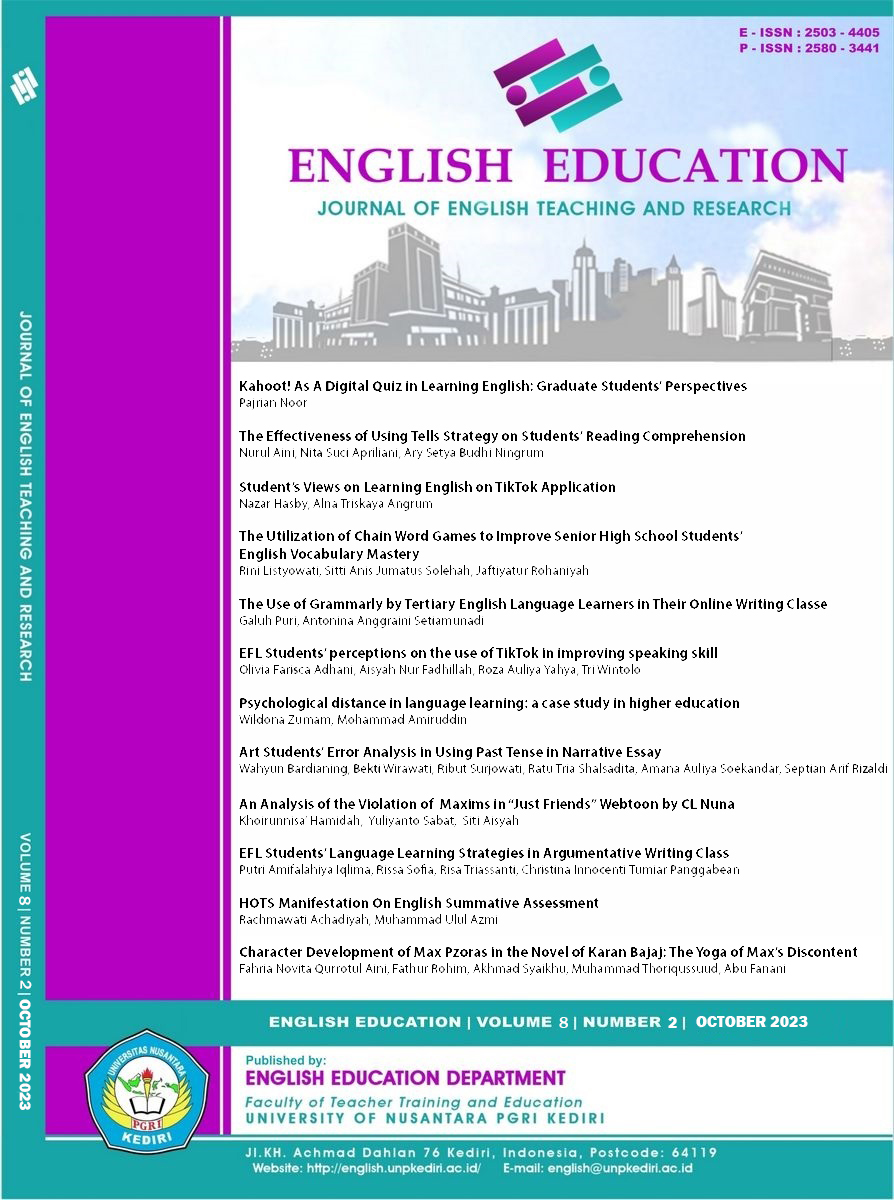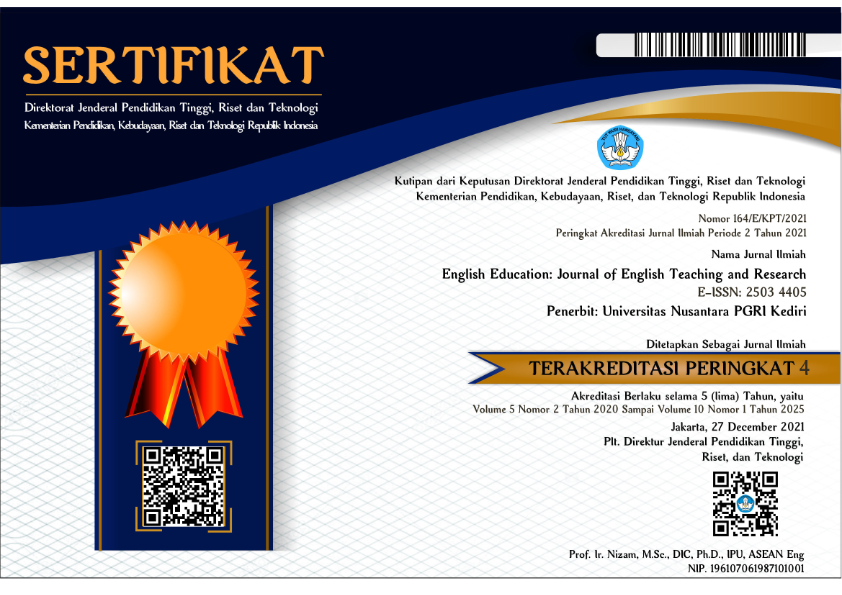EFL Students’ perceptions on the use of TikTok in improving speaking skill
DOI:
https://doi.org/10.29407/jetar.v8i2.21005Keywords:
English, learning English, EFL, TikTok, speaking skillAbstract
Currently, many different methods are being used to learn English as it occurred today, combining a variety of media or applications, including TikTok videos. Different student attitudes emerge as a result of the possibility of studying English through Tiktok videos. This study aims to investigate students' opinions and the difficulties they encounter when using TikTok videos to hone their speaking abilities. Descriptive qualitative method was employed in this study. Nine students from one reputable Islamic private senior high school in Bekasi, West Java were served as the study's subjects. Since some students were discovered using tiktok videos to practice English, the nine participants were selected and considered qualified for data collection through interview. Based on the result of this study, students had an assortment of perspectives on using TikTok videos to learn English, both favorable and unfavorable ones. Further, utilizing TikTok videos for teaching English to students presented a number of difficulties. Confirming to the results of this study, students had both advantageous and negative opinions on utilizing TikTok videos to learn English. Additionally, there were several kinds of difficulties that arose when students utilized TikTok short clips to study English.
Downloads
References
Apoko, T. W., & Chong, S. L. (2022). The Attitudes of Primary Teacher Education Program Students towards Utilizing Flipgrid in English Speaking Skill. 7(2), 154–160. https://doi.org/https://dx.doi.org/10.26737/jetl.v7i2.3305
Celeste, E. (2021). Digital punishment: social media exclusion and the constitutionalising role of national courts. International Review of Law, Computers & Technology, 35(2), 162–184. https://doi.org/10.1080/13600869.2021.1885106
De Leyn, T., De Wolf, R., Vanden Abeele, M., & De Marez, L. (2022). In-between child’s play and teenage pop culture: tweens, TikTok & privacy. Journal of Youth Studies, 25(8), 1108–1125. https://doi.org/10.1080/13676261.2021.1939286
Diko Putri, S. M. (2022). the Effectiveness of Using Tiktok To Improve Efl Learners’ Speaking Ability. Mimesis, 3(2), 101–110. https://doi.org/10.12928/mms.v3i2.6096
Dutta, S. (2020). the Importance of “English” Language in Today’S World. International Journal of English Learning & Teaching Skills, 2(1), 1028–1035. https://doi.org/10.15864/ijelts.2119
Escamilla-Fajardo, P., Alguacil, M., & López-Carril, S. (2021). Incorporating TikTok in higher education: Pedagogical perspectives from a corporal expression sport sciences course. Journal of Hospitality, Leisure, Sport and Tourism Education, 28(February). https://doi.org/10.1016/j.jhlste.2021.100302
Ferstephanie, J., & Lady Pratiwi, T. (2022). the Effect of Tiktok Platform To Develop Students’ Motivation in Speaking Ability: a Classroom Action Research. Wiralodra English Journal, 6(1), 1–12. https://doi.org/10.31943/wej.v6i1.147
Gao, S.-Y., Tsai, Y.-Y., Huang, J.-H., Ma, Y.-X., & Wu, T. (2023). TikTok for developing learning motivation and oral proficiency in MICE learners. Journal of Hospitality, Leisure, Sport & Tourism Education, 32, 100415. https://doi.org/https://doi.org/10.1016/j.jhlste.2022.100415
Herlisya, D., & Wiratno, P. (2022). Having Good Speaking English through Tik Tok Application. Journal Corner of Education, Linguistics, and Literature, 1(3), 191–198.
Ishtiaq Khan, R. M., Radzuan, N. R. M., Farooqi, S. U. H., Shahbaz, M., & Khan, M. S. (2021). Learners’ perceptions on WhatsApp integration as a learning tool to develop EFL vocabulary for speaking skill. International Journal of Language Education, 5(2), 1–14. https://doi.org/10.26858/ijole.v5i2.15787
Jaffar, B. A., Riaz, S., & Mushtaq, A. (2019). Living in a moment: Impact of TicTok on influencing younger generation into micro-fame. Journal of Content, Community and Communication, 10(5), 187–194.
Jung, H., & Zhou, Q. (2019). Learning and Sharing Creative Skills with Short Videos: A Case Study of User Behavior in TikTok and Bilibili.
Miles, M. B., Huberman, A. M., & Saldana, J. (2014). Qualitative data analysis (3rd ed.). Sage.
muhammad ilyas, M. E. P. (2020). J-SHMIC : Journal of English for Academic. J-SHMIC : Journal of English for Academic, 7(1), 66–76.
Namaziandost, E. (2019). The Impact of Social Media on EFL Learners’ Speaking Skill: A Survey Study Involving EFL Teachers and Students. Journal of Applied Linguistics and Language Research, 6(3), 199–215.
Pratiwi, A. E., Ufairah, N. N., Sopiah, R. S. (2021). Utilizing Tiktok Application As Media For Learning English Pronunciation. Proceedings International Conference on Education of Suryakancana, 21(April), 85–98.
Qiyang, Z., & Jung, H. (2019). Learning and Sharing Creative Skills with Short Videos: A Case Study of User Behavior in TikTok and Bilibili. International Association of Societies of Design Research Conference, 10, 25–50.
Rahmawati, A., Syafei, M., & Prasetiyanto, M. A. (2023). Improving Speaking Skills through Tiktok Application: An Endevour of Utilizing Social Media in Higher Education. Journal of Languages and Language Teaching, 11(1), 137. https://doi.org/10.33394/jollt.v11i1.6633
Rahmawati, Y., & Anwar, K. (2022). the Use of Tiktok Application: the Impact on Students’ Vocabulary and Attitude. PROJECT (Professional Journal of English Education), 5(Vol 5, No 3 (2022): VOLUME 5 NUMBER 3, MAY 2022), 610–621.
Rao, P. (2021). The Role of English As Global Language. Edukasi, 19(1), 21. https://doi.org/10.33387/j.edu.v19i1.3200
Rao, P. S. (2019). The Importance Of Speaking Skills In English Classrooms. Alford Council of International English & Literature Journal(ACIELJ), 401(2), 6–18.
Taylor, S. J., Bogdan, R., & DeVault, M. (2015). Introduction to qualitative research methods: A guidebook and resource. John Wiley & Sons.
Vizcaíno-Verdú, A., & Abidin, C. (2023). TeachTok: Teachers of TikTok, micro-celebrification, and fun learning communities. Teaching and Teacher Education, 123, 103978. https://doi.org/https://doi.org/10.1016/j.tate.2022.103978
Xiuwen, Z., & Razali, A. B. (2021). An Overview of the Utilization of TikTok to Improve Oral English Communication Competence among EFL Undergraduate Students. Universal Journal of Educational Research, 9(7), 1439–1451. https://doi.org/10.13189/ujer.2021.090710
Yang, H. (2020). Secondary-school Students’ Perspectives of Utilizing Tik Tok for English learning in and beyond the EFL classroom. 2020 3rd International Conference on Education Technology and Social Science (ETSS 2020), 1, 162–183.
Yusuf, K., & Mabagits, S. (2020). Does activeness in organization improve English speaking skill? : University students’ perspective. Leksika: Jurnal Bahasa, Sastra Dan Pengajarannya, 14(2), 73. https://doi.org/10.30595/lks.v14i2.7383
Zaitun, Z., Hadi, M. S., & Indriani, E. D. (2021). TikTok as a Media to Enhancing the Speaking Skills of EFL Student’s. Jurnal Studi Guru Dan Pembelajaran, 4(1), 89–94.
Zuo, H., & Wang, T. (2019). Analysis of Tik Tok User Behavior From The Perspective of Popular Culture. Frontiers in Art Research, 1(3), 01–05. https://doi.org/10.25236/FAR.20190301
Downloads
Published
Issue
Section
License
Authors who publish with this journal agree to the following terms:
- Copyright on any article is retained by the author(s).
- The author grants the journal, the right of first publication with the work simultaneously licensed under a Creative Commons Attribution License that allows others to share the work with an acknowledgment of the work’s authorship and initial publication in this journal.
- Authors are able to enter into separate, additional contractual arrangements for the non-exclusive distribution of the journal’s published version of the work (e.g., post it to an institutional repository or publish it in a book), with an acknowledgment of its initial publication in this journal.
- Authors are permitted and encouraged to post their work online (e.g., in institutional repositories or on their website) prior to and during the submission process, as it can lead to productive exchanges, as well as earlier and greater citation of published work.
- The article and any associated published material is distributed under the Creative Commons Attribution-ShareAlike 4.0 International License








 Article template
Article template



